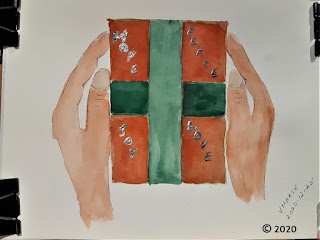Feast of the Epiphany—3 January 2021
Today is the feast of the Epiphany, which is one of the feasts where the readings are the same each year. The word “epiphany” comes from the ancient Greek word, epiphaneia, which means “manifestation or striking appearance." An epiphany is an experience of sudden and striking realization. Although the term is generally used to describe scientific breakthroughs and religious or philosophical discoveries, it can also apply to any situation in which an enlightening realization allows a problem or situation to be understood from a new perspective. For example, the pandemic, the police killings of George Floyd in the States, and Chantel Moore in Canada, revealed the cracks in our social fabric. But along with these tragedies, social concern engendered heroic acts of compassion and collaboration in many individuals and groups.
In the second line of the Second Reading, the lectionary version says “… that the mystery was made known to me by revelation.” In the full passage, Paul continues the sentence stating, “and how the mystery was made known to me by revelation, as I wrote above in a few words, a reading of which will enable you to perceive my understanding of the mystery of Christ.” What Paul is referring to in “As I wrote above” is that he wrote at the end of the previous chapter (Ephesians 2:21-22), “In Christ the whole structure is joined together and grows into a holy temple in our God; in Christ you also are built together spiritually into a dwelling-place for God.” John the Evangelist put it this way, “Abide in me as I abide in you. Just as the branch cannot bear fruit by itself unless it abides in the vine, neither can you unless you abide in me.”
What Paul and John are saying in a nutshell is that we are all joined in Christ. Through Christ we dwell in God and God dwells in us. It is through this lens that I looked at today's Gospel. I saw the Magi as examples for us, in that we should follow the light that brings us to see the child—the God-seed—within us and in others.
The gifts the Magi bring can also be seen as symbols of our Baptism. In the New Testament, John’s Gospel tells us that Nicodemus brought a mixture of myrrh and aloes for the preparation of Jesus’ body for burial. Old Testament references tell us that frankincense was a holy perfume used in the sanctuary; and, that myrrh was used in the anointing of the High Priest. Baptism reminds us that we die and rise again in Christ. The Wise Men also bring gold, which is associated with wealth and royalty. However, we are to be royalty that acts according to God's plan and that means more as good shepherds than rulers over people. So, the gifts of the Magi have baptismal significance, reminding us that we are priests, prophets and good shepherds.
The pandemic has forced us see the fault lines in the complacent world view that places power and profit as more important than the common good. As we enter 2021, let us remember that the kindom of God is within in us. As priests, prophets and good shepherds in Christ, we are not to fall for the false advertising of modern day herods. Rather, we are to nurture the God-seed within us. We are called to return to our core, collectively and individually. We are called to follow the direction placed in our hearts by the Holy Spirit for the benefit of all.
So, take a moment, then please share an epiphany that you have had over this Christmas season.




Comments